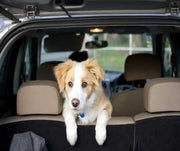Pets May Improve Social Skills in Children with Autism

Looking after an animal can be a lot of hard work, and some animals can create huge messes. But if you have the means to take care of one it is something you should do. Animals are great companions not only for grown adults but for children.
Child Development Benefits
The role of a pet can help teach things to your kids that may be hard without one. Research has shown that pets can help children create better relationships with people.1 Animals, and specifically, dogs can improve your child’s; responsibility, empathy skills, stress management, relationships, coping skills, family bonding, self-esteem, and social skills.
Social Skill Improvement
Science has proven that dogs improve social skills in children. If your child is shy and reserved, a dog can help bring them out of their shell. For children with autism, socialization can be one of the most difficult things and can make it hard to interact with children their own ages.2 Studies have shown that children with pets at home have more advanced social skills and are more assertive than those without. Their pets act as a “social lubricant” that helps to build confidence in their actions.
A study by the University of Missouri found that autistic children were likely to engage in social situations where pets were present. Children with pets at home were also reported to be more likely to introduce themselves, ask for information or respond to people’s questions. These types of interactions can be difficult for children with autism, but since they lived with a pet, their confidence was higher.4 If a child has a bond with their pet when a visitor asks questions about the animal, that child will be more likely to answer their questions and interact with the visitor.
Though dogs often get most of the credit when referring to therapeutic animals, all pets can help with developing social skills for children. Remember every child is different so don’t forget about cats, rabbits, rodents, and birds!
Sources:
Previous article

Next article

Related posts
View all-

How to Keep Your Pet Calm During Thanksgiving
Thanksgiving is a time for family, friends, and food, but for our pets, the holiday can be overwhelming. The sudden change in routine, unfamiliar faces and scents, and increased noise can trigger significant stress. Understanding why your pet might feel anxious is the first step toward creating a peaceful holiday experience for everyone, including your furry family members. This guide offers calming tips for pets and practical solutions to ensure your dog or cat feels safe and secure during the festivities.
Read Article -

Top Travel Essentials for Pets This Holiday Season
Holiday travel often means bringing the whole family along, and for many of us, that includes our furry companions. Preparing for holiday pet travel is about more than just packing a bag; it's about ensuring your pet's safety, comfort, and happiness from the moment you leave home until you return. A little planning helps reduce stress for both you and your pet, making the journey a positive experience for everyone involved.
Read Article -

Best Leashes and Collars for Daily Walks: A Pet Parent’s Guide
A daily walk with your dog isn't just a chore—it's a chance to bond, explore, and stay active together. The right leash and collar can make every walk safer and more enjoyable for both of you. With numerous styles and materials available, it's essential to find gear that suits your dog's needs and your lifestyle.
Read Article



